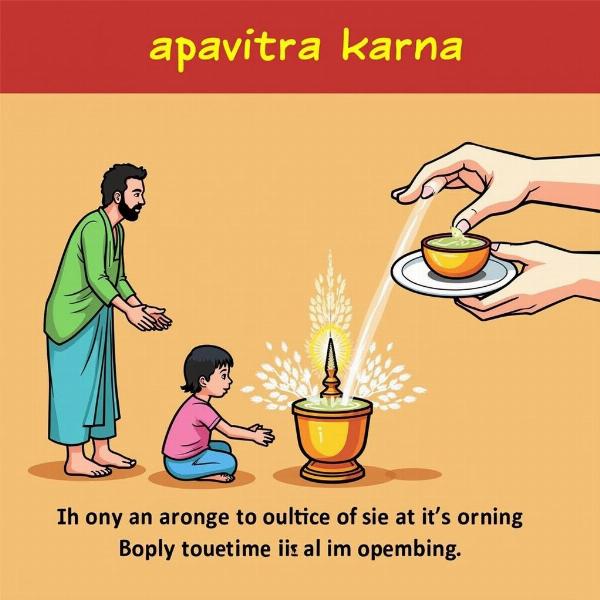Befoul meaning in Hindi encompasses the act of making something dirty, impure, or polluted. Understanding the true essence of “befoul” goes beyond a simple translation. This article delves into the various Hindi equivalents, exploring their subtle differences and cultural contexts. Whether you’re translating a document, learning Hindi, or simply curious about the language, this comprehensive guide will provide valuable insights into the meaning of “befoul” in Hindi.
Exploring Hindi Translations of “Befoul”
The Hindi language offers several ways to express the concept of “befoul,” each with its own nuances. Some common translations include:
-
अपवित्र करना (apavitra karna): This is perhaps the most direct translation, signifying “to make impure” or “to defile.” It often carries a religious or spiritual connotation, referring to the desecration of something sacred.
-
गंदा करना (ganda karna): This translates to “to make dirty” or “to pollute.” It’s a more general term and can be used in various contexts, from physical dirt to moral corruption.
-
दूषित करना (dushit karna): Meaning “to contaminate” or “to corrupt,” this term often refers to polluting the environment or spoiling food. It can also apply to corrupting someone’s morals or character.
-
मिलावट करना (milavat karna): This term specifically refers to “adulteration,” often used in the context of food or other products. It implies the addition of inferior substances, thus reducing the quality or purity of the original.
-
कलंकित करना (kalankit karna): This translates to “to tarnish” or “to stain,” often used figuratively to describe damaging someone’s reputation or honor.
 Apavitra Karna – Defilement in Hindu Rituals
Apavitra Karna – Defilement in Hindu Rituals
Befoul Meaning in Different Contexts
The best Hindi translation for “befoul” depends on the specific context. For example, if you’re talking about polluting a river, “dushit karna” would be appropriate. If you’re discussing someone’s tarnished reputation, “kalankit karna” would be a better fit.
Befouling the Environment
When discussing environmental pollution, “dushit karna” and “ganda karna” are commonly used. Consider the sentence, “The factory befouled the river with its waste.” This could be translated as “कारखाने ने अपने कचरे से नदी को दूषित कर दिया (karkhane ne apne kachre se nadi ko dushit kar diya).”
Befouling Someone’s Reputation
In the context of damaging someone’s reputation, “kalankit karna” is often the most appropriate translation. For instance, “His actions befouled his family name” could be translated as “उसके कार्यों ने उसके परिवार के नाम को कलंकित कर दिया (uske karyon ne uske parivar ke naam ko kalankit kar diya).”
Befouling Food
When talking about contaminated food, “dushit karna” or “milavat karna” would be appropriate. For example, “The food was befouled by insects” could be translated as “भोजन कीड़ों से दूषित हो गया था (bhojan kીdon se dushit ho gaya tha).”
Choosing the Right Word
Choosing the correct Hindi word for “befoul” requires understanding the subtle differences between the available options. Consider the context, the level of formality, and the specific nuance you want to convey.
What does it mean to befoul something sacred?
Befouling something sacred often refers to the act of desecration, making it impure or unholy. In Hindi, this is best conveyed using “apavitra karna.”
Conclusion
Understanding the meaning of “befoul” in Hindi requires more than a simple dictionary lookup. By exploring the different Hindi translations and their nuances, you can choose the most appropriate word for any given context. This ensures accurate and culturally sensitive communication, whether you’re translating a document, learning Hindi, or simply exploring the richness of the language.
FAQ
-
What is the most common Hindi translation of “befoul”? While several options exist, “apavitra karna” and “ganda karna” are among the most common.
-
How do I choose the right Hindi word for “befoul”? Consider the context and the specific nuance you want to convey.
-
Is “befoul” always used in a negative context? Yes, “befoul” generally implies making something dirty, impure, or polluted, which carries a negative connotation.
-
Can “befoul” be used figuratively? Yes, “befoul” can be used figuratively, such as when describing a tarnished reputation.
-
What is the difference between “dushit karna” and “ganda karna”? While both mean “to make dirty,” “dushit karna” often implies contamination or corruption, while “ganda karna” is a more general term for making something dirty.
-
What does “milavat karna” mean? “Milavat karna” specifically refers to adulteration, often used in the context of food or other products.
-
When is “kalankit karna” the most appropriate translation? “Kalankit karna” is best used when referring to damaging someone’s reputation or honor.
Meaning-Hindi.in: Your Trusted Partner for Hindi Translations
Meaning-Hindi.in offers comprehensive Hindi translation services catering to diverse needs, including business, legal, technical, website localization, and academic document translation. We provide accurate, culturally sensitive translations, ensuring your message resonates effectively with your target audience. Whether you require quick turnaround times or specialized expertise, Meaning-Hindi.in is committed to delivering high-quality language solutions. Contact us today for a personalized quote: Email: [email protected], Phone: +91 11-4502-7584.